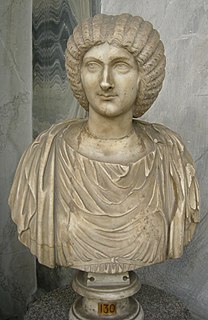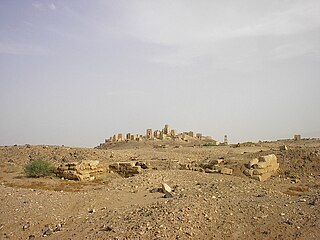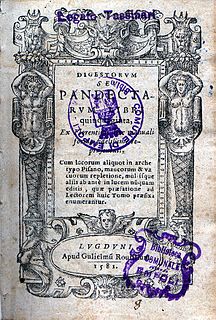The 200s decade ran from January 1, 200, to December 31, 209.

The gens Julia or Iulia was one of the most ancient patrician families at Ancient Rome. Members of the gens attained the highest dignities of the state in the earliest times of the Republic. The first of the family to obtain the consulship was Gaius Julius Iulus in 489 BC. The gens is perhaps best known, however, for Gaius Julius Caesar, the dictator, and grand uncle of the emperor Augustus, through whom the name was passed to the so-called Julio-Claudian dynasty of the 1st century AD. The nomen Julius became very common in imperial times, as the descendants of persons enrolled as citizens under the early emperors began to make their mark in history.

Julia Domna was a Roman empress of Syrian origin, the second wife of Septimius Severus. She was born in Emesa in the Roman province of Syria, into a family of priests of the deity Elagabalus. As a powerful political figure and member of the imperial family, Julia received titles such as "mother of the army camps". She was famous for her political and philosophical influence.

The gens Aquillia or Aquilia was a family at Rome with both patrician and plebeian branches. This gens was of great antiquity. Two of the Aquillii are mentioned among the Roman nobles who conspired to bring back the Tarquins, and a member of the house, Gaius Aquillius Tuscus, was consul in 487 BC.
Gaius or Lucius Fulvius Plautianus was a member of the Roman gens Fulvia.
Julius Paulus Prudentissimus was one of the most influential and distinguished Roman jurists. He was also a praetorian prefect under the Roman Emperor Alexander Severus.
Gaius Julius Bassianus or Bassus, also known as Julius Bassianus was an Arab high priest for the Temple of the Sun in Emesa, which was adored in a shape of a black stone. The Aramaean Sun God in Aramaic is El-Gebal. Bassianus was a member of the Royal family of Emesa. The Royal Family was a part of the Arab aristocracy in Emesa and was a client kingdom of the Roman Empire. The beginning of his priesthood is unknown but by 187, he was a high priest at Emesa. Bassianus was a son of a Julius and his paternal uncle was Julius Agrippa, who served as a Primipilaris.
Julius Avitus also known by his full name Gaius Julius Avitus Alexianus was a Syrian nobleman who had an impressive Roman military and political career.
Marcus Julius Gessius Marcianus also known as Gessius Marcianus was a Syrian Roman Aristocrat.
Aelius Marcianus was a Roman jurist who wrote after the death of Septimius Severus, whom he calls Divus in his excerpts from the Pandects. Other passages in the same source show that he was then writing under Antoninus Caracalla, the son and successor of Severus. It also appears from his Institutiones that he survived Caracalla. It is therefore probable that he also wrote under Alexander Severus, whose reign commenced 222 AD. Caracalla died in 217. Another Aelius Marcianus is cited in the Pandects, who was proconsul of Hispania Baetica in the time of Antoninus Pius.

The Roman presence in the Arabian Peninsula had its foundations in the expansion of the empire under Augustus, and continued until the Arab conquests of Eastern Roman territory from the 7th century onward. The Romans never managed to conquer the peninsula proper.
The gens Erucia was a plebeian family at Rome. Members of this gens are first mentioned early in the first century BC; the name has been claimed as Etruscan. However, in the second century of the Empire, the Erucii attained considerable distinction.
Julius Alexander also known as Julius Alexander of Emesa was prince from the Royal family of Emesa who lived in the 2nd century.
Julius Agrippa was a Syrian nobleman from the Royal family of Emesa who lived in the 2nd century.
Tiberius Julius Balbillus also known as Julius Balbillus and Aurelius Julius Balbillus was an Emesene Aristocrat from the Royal family of Emesa in Roman Syria who served as a Priest of the cult of El-Gebal in Rome during the reigns of the Severan Roman emperors Lucius Septimius Severus reign 193-211 and Caracalla reign 211-217. El-Gebal is the Aramaic name for the Syrian Sun God.
Titus Julius Balbillus was an Emesene aristocrat from the Royal family of Emesa in Roman Syria who served as a priest of the cult of El-Gebal in Rome during the reigns of the Severan Roman emperors Lucius Septimius Severus, reign 193–211 and Caracalla, reign 211–217. El-Gebal is the Aramaic name for the Syrian Sun God.
Marcus Julius Gessius Bassianus was a Magister (master) in the Arval Brethren during the reign of Roman emperor Caracalla who ruled from 212 until 217.

Theoclia was a Syrian Roman noblewoman.
The gens Nummia was a plebeian family at Rome. Members of this gens appear almost exclusively under the Empire. During the third century, they frequently obtained the highest offices of the Roman state.
The public domain consists of all the creative works to which no exclusive intellectual property rights apply. Those rights may have expired, been forfeited, expressly waived, or may be inapplicable.
John Thomas Graves (1842–1950) was one of the last surviving Confederate soldiers from the American Civil War.

Sir William Smith was an English lexicographer. He also made advances in the teaching of Greek and Latin in schools.







